How to Be A Playwright In The New Play Rehearsal Room
My favorite place in the world is a room filled with artists joining together to create a shared vision.
Being a playwright in the rehearsal room isn’t like being a playwright writing alone. It can be far more rewarding and complex. And it was only by working on one show after another that I learned what’s needed from me in that room, and what I need from others.
As I write this, I’m in rehearsals for my new play, The Last Burlesque, premiering at the Capital Fringe Festival this summer. Because I’ve stepped away from rehearsals for a few days (see #7), I thought I’d take the opportunity to write down a few best practices I’ve learned (and continue to re-learn) about being the writer in the room.
1. Be in the room.
If it’s a brand new play, be present during those first couple weeks. Don’t stick around for the table work and then ghost out. When a play gets on its feet, you start learning things you couldn’t imagine when it only lived on the page.
Conversations will happen. Questions will be asked about character, plot, and structure. Where should somebody move? Why is somebody doing one thing and not the other? These questions might make their way to you in the rehearsal report. Being present to understand the context of questions and respond with a conversation is worlds better than responding to your stage manager via e-mail.
2. Socialize with your director.
Drink, dance, jog, do yoga, or just meet for coffee with your director. Very soon you’re going to have some intense conversations with this person. Those conversations might be contentious, which isn’t bad. A quality I value in directors is their ability to frequently, but productively argue with me. But it’s tough to productively fight with someone when your relationship is limited to those few hours in the rehearsal room. If you’re not comfortable getting your hands, brains, and artistic sensibilities dirty with your director, it’s doubly difficult to speak up in support of your own point-of-view, or listen with an open mind to theirs.
3. Actors are smart. Frequently they are smarter than you.
When everyone sits down for that first table read, you are unequivocally the world’s leading authority on your play. This will change swiftly.
Actors might not become deeply versed in the arc of the whole play, but they will understand their characters in ways you never dreamed. If a character says something that doesn’t fit their personality, or does something that doesn’t track with their emotional arc, the actor will be the first to know. They need to feel comfortable voicing that, and you need to be receptive and listen.
I continually stress to my cast that if they ever have questions, they should feel free to approach me. Like writers, most actors feel that if something isn’t working, it’s probably their fault. They will try their damndest to make a moment work when the best solution might be a quick conversation followed by a quicker revision.
All of the above can apply just as easily to designers, your director, and even your stage manager—who has probably sat in on more rehearsals than you will in a lifetime.
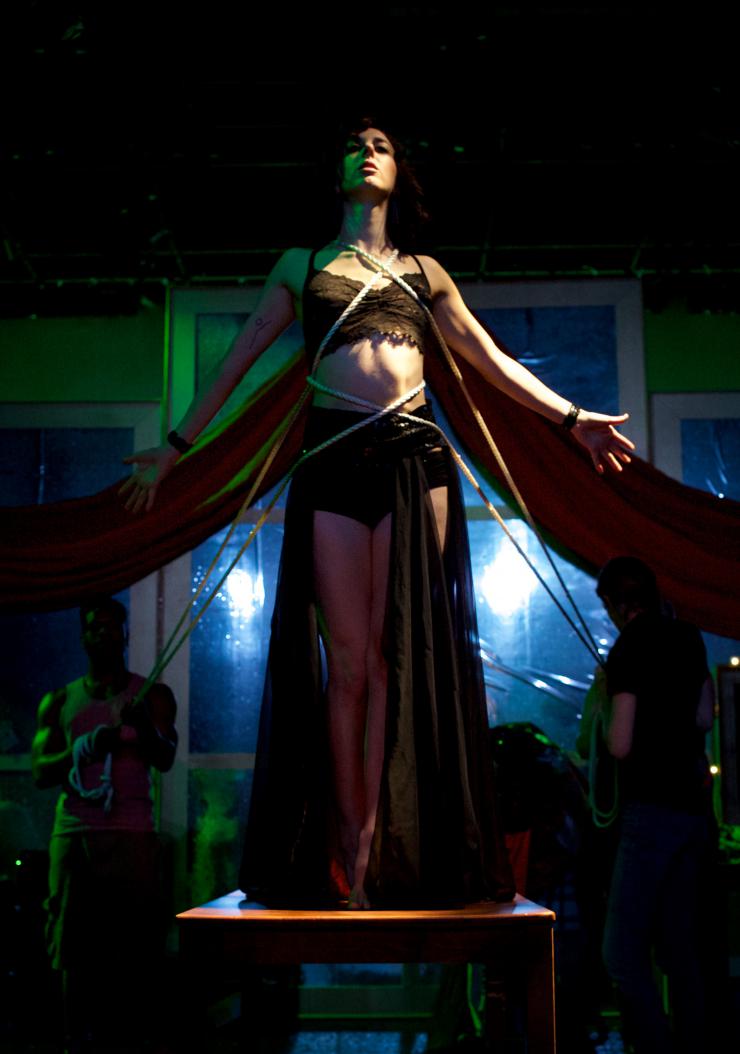
Every rehearsal room has the potential for innumerable moments of joy.
4. A script is a blueprint, except when it’s a battle plan.
There are some who contend that a play script is a work of art unto itself and can be enjoyed as such. Those who think otherwise commonly describe a script as a blueprint from which other artists build—not a bad metaphor.
If an architect does her job right, she can hand a blueprint to the builders and the structure that emerges will look pretty much spot-on to what she designed. No adjustment necessary as long as the math is right. I’ve been reminded with The Last Burlesque that the blueprint metaphor can fall apart pretty quickly when it comes to new plays.
I can’t count the number of times in this process that a chunk of dialogue that flowed perfectly on the page became unwieldy once actors were saying it, and moving in the space. Entire beats flutter to the cutting room floor because they were utterly unnecessary when living bodies acted it out.
With this particular play, I’ve consciously put much of the dramatic action into non-verbal elements. Character development happens in a dance, while an emotional climax arrives in a burlesque. Because of that, I came into the process knowing that a lot would probably shift as soon as we started moving. I pictured many scenes as battle plans—something that made for a good start, but did not survive in the rehearsal room.
It’s been a change in my mindset that’s made things go much more easily and productively than if I’d come in unwilling to adapt. Which reminds me…
5. Be willing to be wrong.
Be willing to accept that other artists in the room will have a better grasp on a character, a scene, or the whole damn play than you. In which case you should…
6. Know when to shut up.
If you’re like me, you want to fix things. You want to have a voice in any discussion that involves story and meaning. But you don’t have to. Most of the time it’s best to sit, wait, and listen.
7. Get out of the room.
I know this step is contrary to the first one, but there is such a thing as revision blindness. If you’ve spent weeks immersing yourself in the beat-to-beat details of character interactions, it becomes harder to step back and see the full arc of the play.
So get out of the room. Take a few rehearsals off. If you’re like me, you don’t want to. Make yourself, or have your director make you leave. When you step back into the room, things you’d become blind to—both positive and negative—will become much clearer.
8. Tech.
Don’t. Let me expand. Don’t go to tech.
For most playwrights, tech is excruciating. You are next to useless. The wonderful nuance, depth, and flow found during the rehearsal process obliterates in a tediously slow wave of false starts, lighting cues, and “Hold please!” If you start trying to give notes in the middle of that, things can get ugly real fast.
Stop by with a basket of whatever keeps your director, cast, and crew going—coffee, whiskey, or peanut butter—and then leave. Go home. Go to the movies. Just go. I polled theatre artists on Facebook, and found that I am with the majority in this opinion. One of the few dissenting voices argued that a playwright should be in the room in case a technical decision impacts the writer’s vision in a negative way.
I would counter that none of the artistic decisions made in tech should come as a surprise if you’ve been having the right conversations with your director and designers. And those first post-tech run-throughs should allow for adjustments. Most designers are used to taking notes and revising on the fly.
9. Have fun
In the midst of all of the above it’s sometimes easy to lose touch with what brought you into the room in the first place: the experience of joining together with other artists to create a shared vision. Every rehearsal room has the potential for innumerable moments of joy. I still honestly can’t think of any place I’d rather be.
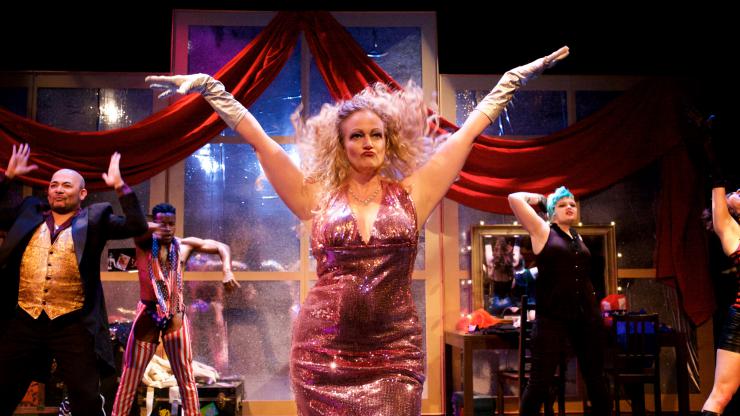


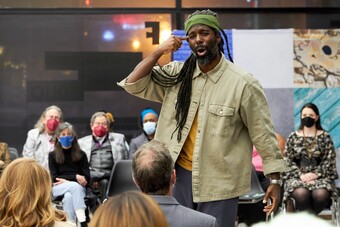




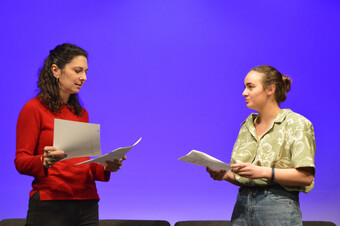

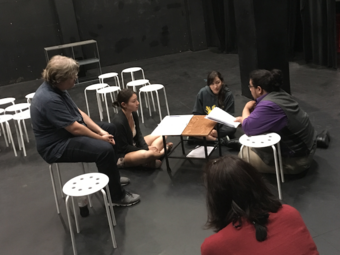


Comments
The article is just the start of the conversation—we want to know what you think about this subject, too! HowlRound is a space for knowledge-sharing, and we welcome spirited, thoughtful, and on-topic dialogue. Find our full comments policy here
Excellent points! I must say, I do go to tech as a solidarity thing. It's boring and painstaking, and I feel bad skipping out on it. I keep my mouth shut (unless I'm actually needed, which is so rare), and I make coffee runs, provide snacks, and buy a round for the crew when we're done for the day. You're never useless if you're providing food!
Stephen, this is a great article and I love the conversation you've started. I've always felt that how a playwright works in the room is the one BIG piece people never talk about. In the last few years I've developed my own way of being in the room.
For me, I disappear after table work and I only return on the weekends. Typically, I do both Saturday and Sunday or sometimes just one day or the other depending on the needs of the director. But I stay away weeknights until a week or so before tech, then I visit more frequently. It's just hard for me to sit through those first few weeks of rehearsal. Blocking and all the early work kills me. The back and forth - I just can't. It's difficult for me because as much as I know that it is a process, I see things that I think I need to "fix" - that don't need to be fixed (yet, maybe) or I become overly concerned about choices that are being made that are incredibly in-flux and process-oriented. It's just easier for me to understand what I'm watching and what I've written when I can see some shape to it. And it gives the director and actors time to address questions/challenges on their own. And I will be there by the weekend if it is something that really needs my attention. And if it's REALLY big then I will definitely come in on a weeknight, if needed.
The other reason why I stay away during the week is due to simple timing. Like the majority of theaters in my area, rehearsals take place in the evenings after folks get off work. That's typically 3 to 4 hours of rehearsal max. But weekends tend to be much longer. Therefore on weeknights it is such a small span of time that I tend to feel that I'm in the way.
Of course, I can change this based on the specifics of the rehearsal process. Some shows I've been at every rehearsal - but that's because its a shorter rehearsal process or a workshop - and you need to be there everyday. And I LOVE those experiences. And my focus increases in that kind of a process.
Also - I love TECH! I get all giddy seeing all the design elements come together.
After writing this I've learned something about myself as a writer. In rehearsal for production (not a workshop or a reading) but for an actual production, I tend to be almost entirely product-oriented. And I believe that's why I keep the schedule I do. For the actors and the director it is a mix of being process-oriented leading to product-oriented. But for me, because I've spent so much time with the play - writing, rewriting, developing, workshops - that I enter rehearsals feeling beyond the process part and ready for the product part. I can't help it. So when I'm not in rehearsal it is my way of giving the actors and director time for their process - to be messy, exploratory and get stuck from time to time. But I don't need to see that. Because I automatically think that is reflective of what the production will be. Because, that's where my mind is at in that moment. Once I can see the play on its feet, then I feel like my product-oriented mind becomes more in sync with what is happening in the room.
Thanks for the responses, Jonathan. Every playwright definitely has a method that fits them. I find that I do at least one solid revision during the rehearsal process, so I try to be in the room during those first weeks as much as possible. I also think my experience in self-production and devised theatre has given me a greater love for process than the average playwright.
Also, kudos on loving tech! You are definitely a rarity.
This is such a great discussion, Stephen.Thank you for writing about this!
A really nice article, Stephen - and full of timeless advice. I'm not sure when we got to the place of playwright as such a solitary artist and often the sole and sacrosanct voice regarding the play in the room, but, as in Shakespeare's time of the actor/playwright - it seems we are collectively rediscovering the idea of collective itself.
This is a GREAT article; thank you!! I think a lot of young (and frankly, experienced :) ) playwrights could get a lot from this. I love especially #3. Actor are smart! But I think that one speaks most to letting trained people use the skills they have--including designers and directors. And of course, all of it boils down to trust, which is the hardest thing. As a director, there's always a moment where I have to say to myself towards opening night to let the actor "take over" the part, and for me to step back. Trust is so hard and so important, but it's also why we love theater--if we wanted to make art all on our own, we wouldn't be in this necessarily collaborative process.
I would like to add a very selfish #10. I have stage managed a LOT of new plays, both with the playwright in the room every day and with the playwright across the country, visiting once or twice. It takes a whole different, additional skill set to stage manage a new play, especially if the playwright is open to (and they should be) making revisions during the process. Not only is there endless copying, the magic of figuring out a page numbering system/color coding that works and makes sense to a lot of people, and very complicated communication between a lot of parties, but keeping track of the suggestions and changes during each rehearsal is very difficult and requires the SM to almost be an additional editor and (frequently but not always) ends up having a very big part in the final script product. So. Recognize their work and thank them. Know their name (especially if it has an unusual spelling). Write them a thank you note for opening night. You don't have to go crazy, or do anything very public, but just know that they are a huge part of the success of a new play, and recognize and appreciate that in some way.
That's a great #10! Really--this list could go on for quite a while before I ran out of best practices. Keeping track of script changes in process is a HUGE job, and if the playwright doesn't have to do all of it then s/he can keep an eye on what's going on in the middle of the room rather than on the page/computer screen. And an SM does this while tracking the blocking, doing schedules, and taking care of every other part of her hydra-headed beast of a job. The SM for Last Burlesque was (and still is, since she's currently running the show) Emily Hambridge, who is absolutely fantastic.